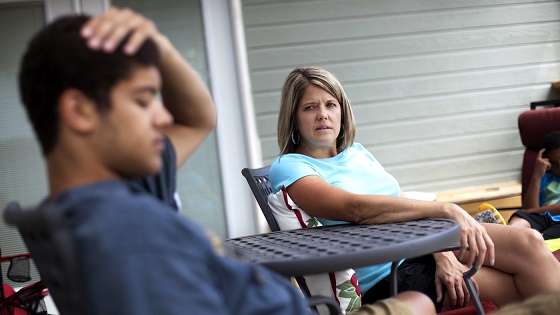
Let’s start by addressing the gaslighting elephant in the room:
I have no interest in parenting your children.
I have a legal and ethical obligation to teach them, and to some degree train them, for an hour or so each day. I’m responsible for their safety and all that good stuff while they’re here. And yes, I end up caring about many of them and occasionally listening when they have something on their minds.
But subverting you or replacing you? Yeah, not so much.
First off, that’s way too much work for what I get paid. I’ve raised my kids, and while they’ve both turned out pretty well, that’s largely in spite of my parenting rather than because of it. Secondly, there’s too much else I’m supposed to accomplish during the limited time I have them. Honestly, even if I wanted to shatter their faith, change their gender, or make them feel horrible about being straight, white, and privileged, I’m having enough trouble getting them to check Google Classroom when they miss class or bring their books on silent reading days.
If we get those things under control, maybe then I’ll spend some time demonizing America or persuading them they might be way gayer than they think.
There are two things about which many of you are apparently all worked up which I suppose I should take partial “blame” for (three if you count my terrible abuse of prepositions just now). The first is that I do, in fact, sometimes use texts in class which disagree with your personal, heartfelt beliefs. The second is that despite my determination to avoid it, I periodically listen to your kids when they’re upset without immediately calling you or state authorities every time.
I’ll wait while you email Tucker Carlson.
The first issue has been well-covered in other blogs you don’t read and news stories from organizations you don’t trust. The short version is that I have way more faith in your kids than you apparently do, and hope they’ll one day be able to function in a complicated, diverse world. I have no interest in making them feel “guilty” for being white (that’s not really a thing, by the way), but I do believe they’ll be more successful personally and professionally if they have some understanding of why many people of color still seem so annoyed by so many things. I wouldn’t even know how to convert them to Islam or any other religion, but I am convinced they’ll be better able to navigate the world around them if they’ve been exposed to some of the basics of other cultures and faiths. (If I were a religious person, I’d also argue they’ll be better able to defend their own faith when they’ve gained insights into the beliefs of others.) I’m pretty sure I lack the ability to turn them gay or spark some previously-buried interest in gender transformation, but personally I’d rather they not self-harm, turn to drugs, or commit suicide based on a misplaced sense of guilt or shame over being whoever they are.
There’s a whole related argument to be had about whether or not it’s sometimes in the best interest of the child to undercut their parents’ extreme ideologies. (“Is it OK to teach the child of a misogynist that women have the same inherent value in the eyes of the law as men?” That sort of thing.) That’s a bigger, even more emotionally loaded question, and not relevant at the moment BECAUSE SCHOOLS ALREADY BEND OVER BACKWARDS (and sometimes forwards) TO AVOID DOING THIS. Having that discussion would require mutual respect and an acknowledgement of complexity that I don’t think we’ve established just yet – so we’ll set that aside for now and instead address the second issue I mentioned above – teachers who “counsel” kids in various ways.
*sigh*
I’ve written before about the impossibility of ignoring a child’s physical and emotional health, even if all we care about are standardized test scores. I’ve tried to explain some of the complexities of wooing teenagers to actually learn the stuff we’re tasked with teaching them, and even resorted to complaining a time or two about the way some parents approach their children’s teachers. It occurs to me, however, that I’ve yet to drop the sarcasm and frustration long enough to simply try to explain something I feel should already be obvious to everyone involved.
It’s good when your child talks to caring adults, even when they’re not you. Sometimes especially when they’re not you.
Taking this as a reflection on your parenting or a subversion of your values is – and I don’t know how else to say this – tragically insecure. My ex-wife (the mother of my now-adult children) and I didn’t always see eye-to-eye about things (hence the ‘ex’ part), but I still remember her reaction when we discovered our then-teenage daughter was sharing uncomfortable details about her home life during some pretty rough years with one of the adult leaders at her church. Rather than get upset, her mother told me how thankful she was that our daughter had found a trustworthy adult outside of the drama to help her process and navigate the feelings and fallout which resulted.
Why did she react that way? Because she cared more about the well-being of our child than she did her ego or mine. Because she recognized that while the relationship of parent and child is unique and sacred, there’s some truth to the whole “it takes a village” mindset as well.
When your kid talks to me about their personal problems, I don’t think about what a bad parent you must be – I think about how difficult it must be for them to navigate complicated situations and emotions at 14 or 15 years of age. I’ve been working with young people for over two decades, and I’ve figured out by now to take everything they say with a shaker or two of contextual salt. With all due respect, it’s not usually about you, or your rights, or your power. Sometimes it’s about them and their need to sort things out or handle their feelings in a non-destructive way.
Yes, if they tell me they’re being abused or harming themselves or going to hurt someone else, I have to call an 800 number and everything is going to suck from there forward no matter what happens next. Most of the time, though, that’s not what they say. Most of the time, they just need a fresh perspective on how to manage the stresses of school, or why their mom is always mad at them, or how come they can’t focus in class, or what is wrong with their math teacher who needs to stop tweakin’ and doin’ too much.
They don’t unload to me because I’m trying to be their parent; they unload to me because I’m not.
See, I don’t have to get them up in the morning when they’re being impossible. I don’t have to deal with the fallout of their poor relationship choices. I don’t have to feel guilty when they get in trouble at school or feel like anyone’s judging me for how they behave. I don’t have to feed them or clothe them or take care of them in any meaningful way beyond learning some reading, writing, and math, and secretly trying to turn them into transgender Muslim socialists.
(I’m kidding about that last part. No, seriously – I am. Dammit… there goes another email to Tucker Carlson.)
That gives me an advantage in some situations. I’m less threatening. I’m less invested. I care about them, and want what’s best for them, but they don’t “answer to me” in any long-term way. They’re not afraid of disappointing me in the same way they often are with you. It’s not a better relationship than you have with them; it’s a different relationship. One I take very seriously, even though it scares me to death. It’s not a responsibility I want, and the entire system is just waiting for me to make the wrong call in the moment and crush me if it can. But I’m also trying to get them through metaphors and appositives and a functional thesis statement, and sometimes they simply can’t focus on such things until we’ve done something about the rest of Maslow’s hierarchy.
I’m not competing with you. You want them to graduate? Me, too. You want them to cooperate better with authority (including yours)? Me, too. You want them to learn how to manage their emotions and find solutions to their struggles that don’t involve self-harm, sex-for-approval, or violence against others? Me, too. You want them to grow up to function in a complicated world? To do better than you did at their age? To be “happy,” whatever that means? Yeah, me too. You want them to share your worldview forever and never be challenged by other beliefs or opinions?
OK, on that one we may not be fully aligned. But still – 6 out of 7, am-I-right?
For what it’s worth, you’re always welcome to come sit in on class and see what we’re actually up to. You have full access to everything I assign to your child – it’s on Google Classroom or Canvas or whatever. I’m happy to discuss why I use the materials I do, as well as share what’s worked and what hasn’t and look for better options. I’m honestly rather excited when a parent wants to collaborate with me to figure out what might best serve their little darling. It happens far too rarely. Sorry if that’s more trouble than yelling at the school board or sharing the latest demagoguery by your elected leaders on Facebook, but it might be way more effective.
If, you know, we both want the same things for your child.

 Dear Engaged, Sincere, Loving, Active Parent(s):
Dear Engaged, Sincere, Loving, Active Parent(s): But you need to chill the $#&@! out.
But you need to chill the $#&@! out. 
 Here’s a news flash – the kids who aren’t feeling loved and validated at home do some pretty sketchy things to scratch that itch in other ways. Many of the ‘bad things’ from which you’re trying to shield them are – not unironically – manifestations of their desperate need for approval, to feel good enough, to be SEEN and HEARD.
Here’s a news flash – the kids who aren’t feeling loved and validated at home do some pretty sketchy things to scratch that itch in other ways. Many of the ‘bad things’ from which you’re trying to shield them are – not unironically – manifestations of their desperate need for approval, to feel good enough, to be SEEN and HEARD.  . Pick something specific they’ve accomplished – especially if they didn’t do it perfectly but worked really hard on it. That soccer game they lost by one goal, but busted their butts trying to stay in. That essay they actually started the day it was assigned (go figure!) but still didn’t get the grade they’d hoped. Kinda cleaning up without being asked. Being relatively patient with their sibling.
. Pick something specific they’ve accomplished – especially if they didn’t do it perfectly but worked really hard on it. That soccer game they lost by one goal, but busted their butts trying to stay in. That essay they actually started the day it was assigned (go figure!) but still didn’t get the grade they’d hoped. Kinda cleaning up without being asked. Being relatively patient with their sibling.  I know you want them to get into a good college, hopefully with some scholarship action. I know you want them to have good lives, good careers, to hang out with the right people and make the best choices. I’m not being sarcastic when I thank you for this; I have far too many kids whose parents aren’t nearly so concerned.
I know you want them to get into a good college, hopefully with some scholarship action. I know you want them to have good lives, good careers, to hang out with the right people and make the best choices. I’m not being sarcastic when I thank you for this; I have far too many kids whose parents aren’t nearly so concerned. 
 It’s tricky to explain without sounding frustrated or hostile that I am, actually, going to some length to begin nudging their child towards young adulthood – some early modicum of personal responsibility.
It’s tricky to explain without sounding frustrated or hostile that I am, actually, going to some length to begin nudging their child towards young adulthood – some early modicum of personal responsibility.
 I’m often amazed at the interactions I have with parents. By and large they let me off WAY too easy. Most tend to be focused on their child and what’s best for them in the long run, with each of us assuming the other to be relatively competent and doing the best they can with the time and resources at their disposal. Some of them have actually become Facebook or Twitter friends, so I see pictures of their dogs and family vacations. We’re not moving in together or anything, but it’s generally been warm and fuzzy and one of the reasons I love my job.
I’m often amazed at the interactions I have with parents. By and large they let me off WAY too easy. Most tend to be focused on their child and what’s best for them in the long run, with each of us assuming the other to be relatively competent and doing the best they can with the time and resources at their disposal. Some of them have actually become Facebook or Twitter friends, so I see pictures of their dogs and family vacations. We’re not moving in together or anything, but it’s generally been warm and fuzzy and one of the reasons I love my job. 1. Don’t talk to your child’s teachers. Why waste your time on the underlings when a little research allows you to directly contact the District Superintendent, Director of Curriculum, Assistant Director of Operations, and whatever an ‘Elementary and Secondary Compliance Manager’ is? Express your outrage and make sure they know WHO YOU ARE (i.e., someone far more important than whatever else is taking up their time and energy).
1. Don’t talk to your child’s teachers. Why waste your time on the underlings when a little research allows you to directly contact the District Superintendent, Director of Curriculum, Assistant Director of Operations, and whatever an ‘Elementary and Secondary Compliance Manager’ is? Express your outrage and make sure they know WHO YOU ARE (i.e., someone far more important than whatever else is taking up their time and energy).
 5. On that note, let’s not forget who this is really about – your child. There’s always someone out there trying to drive you apart from your baby, spreading their maliciously smooth rhetoric about development, maturity, and taking on personal responsibility. Fine. One day, maybe. But NOT today, and not in High School, or College, or those first few Nobel-worthy careers, or planning your dream wedding, or in that first marriage, or –
5. On that note, let’s not forget who this is really about – your child. There’s always someone out there trying to drive you apart from your baby, spreading their maliciously smooth rhetoric about development, maturity, and taking on personal responsibility. Fine. One day, maybe. But NOT today, and not in High School, or College, or those first few Nobel-worthy careers, or planning your dream wedding, or in that first marriage, or –  6. Exploit weakness. Every time a teacher bends a policy to accommodate you, or an administrator responds with more than five words to your eleven page email of demands and complaints, it’s a sign you’re winning. A weaker parent would appreciate the gesture and back down – they’d “compromise.” Don’t fall for it. You’ve got your inch; double down and grab that ell.
6. Exploit weakness. Every time a teacher bends a policy to accommodate you, or an administrator responds with more than five words to your eleven page email of demands and complaints, it’s a sign you’re winning. A weaker parent would appreciate the gesture and back down – they’d “compromise.” Don’t fall for it. You’ve got your inch; double down and grab that ell.  Even better, word will get around to avoid any real standards or expectations regarding your child – it’s just not worth the costs, especially with 150 other kids who need our help, our best lesson planning, our most creative adjustments, and our well-rested, back-in-perspective attention. You’ll have won, and your child will be safe – at least until some foolish, idealistic educator slips and treats them just like everyone else again.
Even better, word will get around to avoid any real standards or expectations regarding your child – it’s just not worth the costs, especially with 150 other kids who need our help, our best lesson planning, our most creative adjustments, and our well-rested, back-in-perspective attention. You’ll have won, and your child will be safe – at least until some foolish, idealistic educator slips and treats them just like everyone else again.